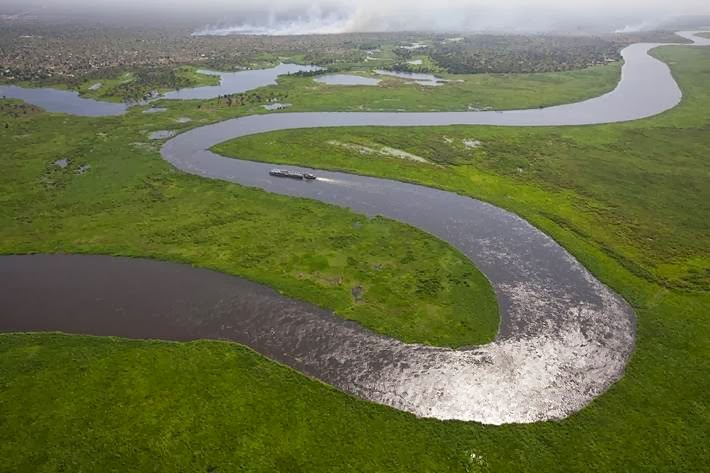You are here: Home | Economy | National News | News | Peace | “Set aside 1929 Sudan-Egypt Nile water deal for new initiative,” Makuei

The Sudd wetland in South Sudan's River Nile. | File/courtesy
The government spokesperson has told the national legislature to enact the Nile Basin Cooperation Framework agreement to enable South Sudan to become a member.
It’s not clear what prompted the call, but the recent reception from the Egyptian government of dredging equipment by the Unity state government sparked a public outcry.
The equipment were to be used to open the Bahr-el Ghazal-Naam tributaries to the Nile River.
This, according to some officials, was aimed to mitigate the devastating impact of floods in the Upper Nile and Bahr el Ghazal regions.
However, President Salva kiir over the weekend suspended the project until a proper environmental socioeconomic impact studies are carried out.
Historically, the 1929 Anglo-Egyptian treaty granted Egypt a veto power over construction projects on the Nile River or any of its tributaries to minimize any interference with the flow of water into the Nile.
The 1959 agreement increased water allocations to both Egypt and Sudan.
Egypt’s water allocation was raised from 48 billion cubic meters to 55.5 billion cubic meters.
However, due to controversies surrounding the shares of the Nile, the Nile basin countries came up with an agreement framework in May 14, 2010.
Four countries that participated in the deal known as Cooperation Framework Agreement were Ethiopia, Rwanda, Tanzania and Uganda – with Burundi and Kenya signing it later.
Between 2013 and 2019, member states; Ethiopia, Rwanda, Burundi, Tanzania and Uganda except Kenya and Burundi ratified the agreement.
Meanwhile, Egypt and Sudan are non-signatories to the agreement.
Speaking during the ongoing public consultations on the suspended planned to dredge the Nile tributaries, Minister Michael Makuei said South Sudan is not yet a member of the Nile Basin agreement.
He said there is need for the country to join the bloc, but the parliament should enact a bill that can allow the country to be a member.
“I think as a new state, if there is a new initiative, call the Nile Basin Initiative, let us set aside all the agreements and commitments that were made by Sudan government.
“Why should we not sign the Nile Initiative and forget about it because we are not bound by it, we are not a party to it. And Sudan government did not come to remind us about the water agreement.
“If we are not reminded, then let us proceed. So, issues of agreement should not worry us.
“The most important thing is my request to the parliament to pass a Nile Basin Initiative act so that we approve it and finalize it. Whoever will come to talk about it, we will face him.”
NILE BASIN TREATY
The regional treaty established principles, rights and obligations to ensure long-term and sustainable management and development of the shared Nile waters.
According to its provisions, the Nile Basin States shall assume the obligation to cooperate on the conservation, management and development of the Basin and its waters.
The treaty establishes a legal basis for a permanent and joint management institution, the Nile River Basin Commission (NRBC), which is vested with legal personality as well as enhance Nile cooperation.
The institution is to ensure that national development projects are coordinated with basin-wide development to achieve optimal use of the Basin’s resources and increase national benefits of regional cooperation.
Ratification process and entry into force.
Ratification process and entry into force
AN EXCERPT FROM NILE BASIN FROM NILE BASIN ORGANIZATION
The Treaty is subject to ratification.
It will not enter into force until at least 60 days after six countries have ratified or acceded to the document and deposited with the African Union.
Signature of the CFA is an intermediate step by which countries indicate their willingness to ratify the Treaty in the future; yet they are under no legal obligation to ratify.
Signature of the treaty puts countries under an obligation not to set any acts that would undermine the objective and purpose of the CFA. (As of March 2011, the CFA has been signed by six countries.)
As long as the treaty has not entered into force the text can be renegotiated; if this results in text changes the new document will be again subject to the two step process of signature and ratification. The Treaty has not legal effect on States that do not sign or ratify the document.
Nile Basin Countries which do not sign or ratify the CFA are not bound by it.
Support Eye Radio, the first independent radio broadcaster of news, information & entertainment in South Sudan.
Make a monthly or a one off contribution.
Copyright 2024. All rights reserved. Eye Radio is a product of Eye Media Limited.